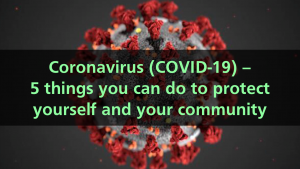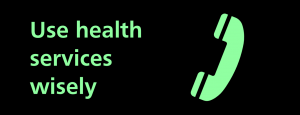
The COVID-19 outbreak is a rapidly evolving situation and information and guidance is therefore updated frequently. This blog was last updated on 13 March 2020 and the information below has since been superseded.
Please visit nhs.uk/coronavirus for the latest health advice or gov.uk/coronavirus for all other information.
In recent weeks cases of coronavirus (COVID-19) have been seen in an increasing number of countries across the world and we expect to continue to see more cases here in the UK over the coming days and weeks.
The UK has well-established plans to deal with outbreaks of infectious disease and everyone can play an important role in making these plans work, slowing down the spread of coronavirus.
We are trying to slow the spread of coronavirus for a number of important reasons:
Firstly, we now know that the majority of people who get the disease experience a mild illness, but because this is a new virus we are not complacent, and our scientists will continue to learn from evidence emerging both here and internationally.
Secondly, though we believe most people will have a mild illness, some older people or people with pre-existing health conditions will experience severe illness and we need to protect them.
Finally, trying to slow an outbreak so everyone isn’t sick at once is an important way to manage pressure on health services and prevent widespread staff sickness absence in our public services and businesses.
There some simple and effective actions everyone can take to protect themselves and their wider community:

1) Wash your hands frequently and catch coughs and sneezes in a tissue
One of the ways we become infected, or pass on viruses to others, is through the droplets in coughs and sneezes – for instance through someone who has a virus, coughing onto their hand, then touching a door handle.
A simple and effective way to protect yourself and others from coronavirus is by making sure you wash your hands frequently with soap and water, or a hand sanitiser if you are out and about. It’s particularly important to wash your hands once you get home or arrive at work or before you prepare or eat food.
If you are unwell it’s vital that you catch your coughs and sneezes in a tissue, or use your arm if needed, throw the tissues away, then wash your hands.
We’ve been promoting a “catch it, bin it, kill it” message through a public information campaign.

2) Be prepared to self-isolate
As COVID-19 is now spreading in the community, people with symptoms of coronavirus should self-isolate at home.
This means staying indoors and avoiding contact with other people for seven days after the onset of symptoms (new, continuous cough and/or high temperature). People can return to normal activity after seven days if they do not have a temperature and feel like they are improving.
If the virus is spreading quickly, we may at a later date ask whole households to self-quarantine, if anyone in the home has symptoms.
It’s very important to point out that we expect that the majority of people who catch COVID-19 will not need to see a health professional as their symptoms will be mild, such as those you might expect with a cold or flu and treatable at home.
We understand that being asked to self-isolate could be inconvenient, frustrating or boring, particularly if you have mild symptoms and feel well enough to go out, but we are only asking people to do this as doctors and scientists believe it is necessary in order to slow the spread of coronavirus, protect people who are vulnerable and help the NHS manage capacity.
Look out for updates from Public Health England, the Department of Health and Social Care or the NHS who will let you know if and when there are any changes to who should self-isolate. If you need to self-isolate, please read this guidance as it will explain what you need to do.

3) Plan ahead based on your situation
There are a number of ways to slow down an infectious disease outbreak. Well-established tactics include self-isolation as mentioned above, as well as measures sometimes referred to as “social distancing.”
One example of social distancing could be encouraging more working from home for instance, or another option could involve urging people to continue to go to work or school as usual, but reduce social activity or non-essential travel.
Looking ahead, what preparations could you put in place to help you self-isolate if you needed to?
Do you have friends or neighbours who could bring food to your house or run errands, or could you do online shopping?
Could you talk to your employer about opportunities to work from home if this became necessary?
If you might be more vulnerable to severe symptoms of coronavirus, have you considered the activities you have planned over the coming weeks, listing which are essential and which you could cancel if you needed to? Could you arrange to work from home?
Don’t forget to think of others too. Do you have friends, family or neighbours who might need extra help?
We understand that people will want to know whether and when any social distancing measures (such as home working and limiting travel, school closures or limiting public gatherings) could happen but it is not possible to confirm this now.
These measures would only be implemented if scientists and experts, including the UK’s Chief Medical Officers, decide they are necessary and proportionate, informed by the latest scientific evidence.
Any decision will balance both the need to protect people with the importance of maintaining day to day life such as going to work or school.

4) Use health services wisely
Now that COVID-19 is considered to be spreading in the community this could mean the NHS is busier than usual so it’s important to think carefully about the NHS services you use.
If you start to experience symptoms and believe you could have coronavirus, do not go to a GP surgery, pharmacy or hospital as you could pass the infection to others. Visit NHS 111 online or call NHS 111 if you need to speak to someone.
Services like 999 or Accident and Emergency should only be used for genuine emergencies.
The first cases of COVID-19 in the UK were taken to specialist hospital wards so we could learn more about the virus and prevent it spreading to anyone else, but now we are beginning to see the virus spreading in the community this approach is no longer be appropriate. It is unnecessary for everyone with COVID-19 to go to hospital as the majority will have mild symptoms.
We expect the majority of people who catch COVID-19 will make a full recovery without medical attention, but if you are concerned because you believe you are at greater risk, or feel your symptoms are becoming more severe, contact NHS 111 or alternatively 999 in an emergency.

5) Stay up to date using trusted sources of information
Since COVID-19 began to spread quickly in China, it has been a major global news story and with this level of media and public interest it’s inevitable that myths, misinformation and rumours will be shared online.
The UK Government and the NHS will keep people informed of new advice and developments. Please check the following sources of advice frequently:
- The UK coronavirus (COVID-19) page will keep you in touch with how the Government is responding.
- The NHS coronavirus (COVID-19) page includes a wide range of health-related information.
- If you are planning to travel abroad check the Foreign and Commonwealth Office travel advice page.
- Follow Public Health England or The Department of Health and Social Care on Twitter for regular updates.
